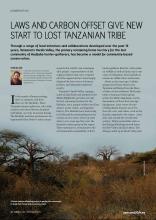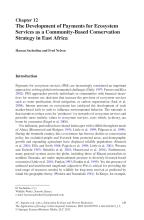Land Library
Bienvenido a la biblioteca de Land Portal. Explora nuestra amplia colección de recursos de acceso abierto (más de 74.000), que incluye informes, artículos de revistas científicas, trabajos de investigación, publicaciones revisadas por pares, documentos jurídicos, vídeos y mucho más.
/ library resources
Showing items 1 through 9 of 29.Una de las principales demandas de los pueblos indígenas es el reconocimiento y seguridad jurídica de sus territorios.
Resumen La violencia armada en Colombia obliga a las personas a abandonar su territorio para salvaguardar la vida.
Pastoralist and hunter-gatherer communities in Tanzania are gaining rights to own and control their land as the foundation for generating new income through REDD+
Con la anexión de las provincias de Arica y Tarapacá a Chile, los aymaras del altiplano debieron inscribir el dominio de sus tierras en los archivos conservadores de la propiedad, de acuerdo con el sistema jurídico del país, situación que otorga a estos registros documentales un papel importante
Through a range of local initiatives and collaborations developed over the past 15 years, Tanzania’s Yaeda Valley, the primary remaining home territory for the last community of Hadzabe hunter-gatherers, has become a model for community-based conservation.
El presente trabajo analiza el efecto de la política hidrocarburífera en Bolivia durante el gobierno de Evo Morales en los dos periodos de su gobierno.
This research attempts to elucidate the beneficial role of the REDD+ mechanism in the mitigation of climate change, as well as justice-related issues to its implementation. It examines equity issues involved in climate change and carbon trading through the REDD+ mechanism.
In this publication two pioneering grassroots organisations from northern Tanzania examine and present their experiences and insights from their long-term work to secure the land rights of hunter-gatherer and pastoral communities.
This paper explores the development of a pilot PES scheme in the Tarangire ecosystem of Tanzania in response to specifi c wildlife declines and policy constraints. It charts the development of this initiative from its genesis based on PES experiences in Kenya.





